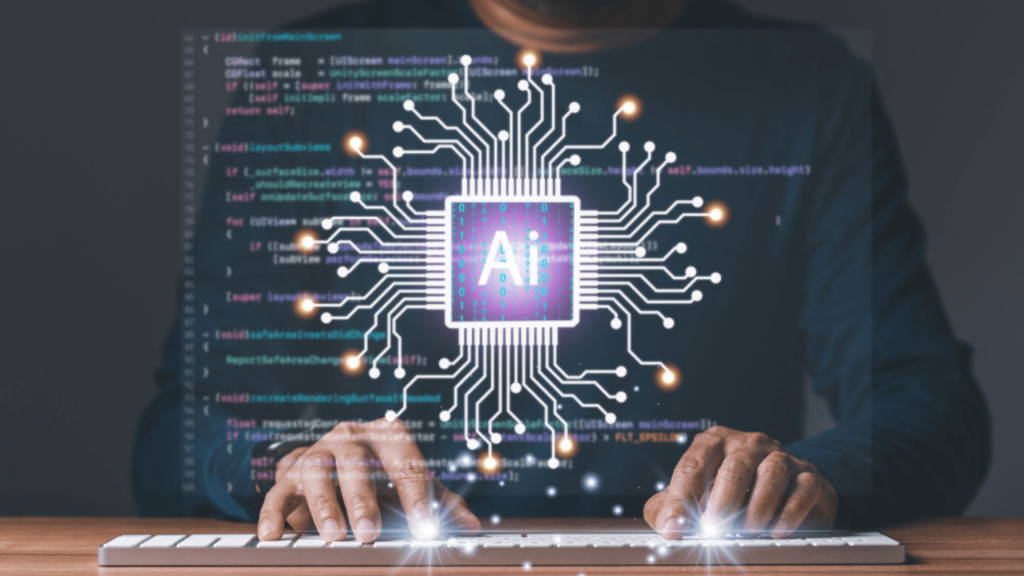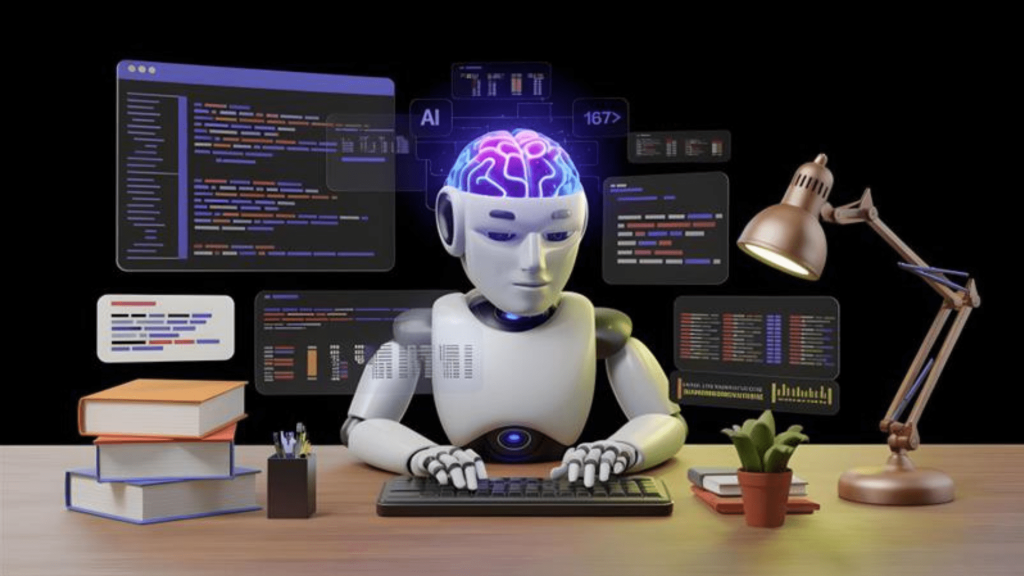Engineering teams are often charged with producing software quickly, accurately, and reliably in today’s fast-paced digital world. Manual processes, repetitive coding, and inefficient testing can hinder traditional software development processes. AI powered development tools utilize machine learning processes to automate, support, and streamline every step in the software development life cycle.
AI development tools can help development teams focus on valuable tasks, such as locating a difficult-to-find function for debugging, developing project time estimates, or deploying changes across multiple environments. The most successful teams utilize AI development tools to “work smarter, not harder.”
If autocomplete that understands your code context, or a test suite that writes itself before bugs reach production. Through AI workflow automation, you are saving time, improving code quality, decreasing risk, and scaling the capacity of your team’s business, all without added burden.
If you’re ready to optimize your development workflow, this is the place for you. Let’s explore how the smartest AI powered development tools are already doing it and how you can, too.
Why Traditional Workflows Fail?
Even the most talented dev teams often find themselves stuck in outdated, inefficient systems. The way software is typically developed still involves numerous manual processes, unproductive planning meetings, pen-and-paper test cases, and line-by-line code reviews.
These types of bottlenecks can lead to missed deadlines, buggy releases, and burnt-out developers. Take planning and estimation, for example. Without historical data or predictive modeling, project timelines are often based on guesswork.
Developers end up coding under pressure, which increases the chances of errors and technical debt. Then, teams spend hours debugging and tracing bugs through massive codebases, often after the damage has already been done.
Manual testing only makes things worse. QA cycles can stretch for days, sometimes weeks, as testers write scripts and manually analyze test coverage. And while CI/CD pipelines are supposed to speed things up, they can become another point of failure when not intelligently managed. When there are no learning or automated tools, teams will always feel behind.
That’s precisely why organizations are turning to AI powered development tools like GitHub Copilot, DeepCode, Snyk, and Tabnine today. These tools don’t only assist development, they fundamentally change it, taking away mundane work and allowing developers to concentrate on building excellent products.
What Are AI-Powered Development Tools?

AI powered development tools are intelligent software solutions designed to enhance and optimize the entire software development workflow using machine learning, natural language processing (NLP), and code generation models. These tools are built to analyze, suggest, automate, and sometimes even execute tasks across every stage of the dev lifecycle.
They are clever collaborators, and they are active, not passive. Whether you are writing code, reviewing pull requests, scanning for actual vulnerabilities, or deploying with confidence. These tools will operate in the background to predict when mistakes are likely to occur, enhance efficiency, and reduce context switching.
Here’s how they function across key attributes in a web development pipeline:
| Workflow Stage | What AI Tools Do | Example Tools |
| Planning & Estimation | Analyze historical data, predict timelines, and allocate resources effectively | LinearB, CodeClimate |
| Code Generation | Suggest, autocomplete, or write code based on context using NLP | GitHub Copilot, Tabnine |
| Code Review | Scan PRs for bugs, security flaws, or syntax issues instantly | DeepCode, Snyk |
| Testing | Autogenerate test cases, validate logic paths, and monitor coverage in real time | Testim.io, ReTest |
| Debugging | Trace errors to the root cause using behavior prediction and automated analysis | Codota, IBM Watson AI |
| CI/CD Pipelines | Automate deployments, monitor environments, and roll back intelligently | CircleCI (AI plugins), Harness.io |
Unlike traditional tools that require human input for every step, AI development tools actively learn from past behavior, understand context, and make autonomous decisions, thereby reducing the cognitive load on developers.
Their true power lies in their ability to interoperate with their environment; most will integrate easily with GitHub, GitLab, Bitbucket, and IDEs such as VS Code and JetBrains. It doesn’t matter if you are a startup with a microservices stack or an enterprise with a monolithic architecture – it will fit and grow with you.
So if you have been wondering, “Is there a better way to build software?” the answer is yes. The most productive teams worldwide are already using it intelligently and in real time.
How AI Tools Optimize Each Workflow Stage

The beauty of AI powered development tools lies not just in automation but in intelligent optimization, turning reactive workflows into proactive engines of innovation. Let’s break down how these tools enhance every stage of the software development workflow, from concept to deployment, by aligning with key attributes and decision-making contexts.
1. Planning & Estimation
Tools: LinearB, CodeClimate, ProjectIQ
Traditional estimation is prone to bias and error. AI tools analyze historical project data, team performance, and story complexity to predict realistic delivery timelines, identify bottlenecks early, and allocate resources more effectively. They align with agile frameworks by connecting tasks, epics, and velocity charts in real-time, improving team synchronization.
Optimization Attribute: Reduced planning time, accurate forecasting, and smart sprint planning.
2. Code Generation
Tools: GitHub Copilot, Tabnine, Replit Ghostwriter
Modern IDEs powered by AI don’t just autocomplete, they anticipate. By learning from millions of public repositories and your private codebase, tools like Copilot suggest full-function blocks, reduce syntax errors, and adapt to your coding style. Developers stay in flow longer and write cleaner, reusable code.
Optimization Attribute: Faster code writing, fewer syntax and logic errors.
3. Code Review & Analysis
Tools: DeepCode, Snyk, SonarQube (AI plugins)
AI accelerates code review by highlighting security vulnerabilities, logic flaws, and even style violations before human reviewers intervene. It also enforces consistent coding standards, checks against known CVEs, and scores code health based on maintainability and testability.
Optimization Attribute: Reduced human workload, early bug detection, improved team code hygiene.
4. Testing & QA Automation
Tools: Testim.io, Mabl, ReTest, Functionize
AI-based testing platforms automatically generate test cases by interpreting user stories, UI flows, or past regression issues. They adapt to UI changes using computer vision and eliminate flaky tests. This makes the QA cycle self-healing, scalable, and more reliable.
Optimization Attribute: Higher test coverage, less manual scripting, lower false positives.
5. Debugging & Error Resolution
Tools: Codota, IBM Watson AIOps, Rookout
AI enables debugging to shift from reactive to predictive. Instead of reading logs line by line, developers receive real-time suggestions, links to relevant documentation, and code change impact predictions. Tools can simulate issues across environments and even propose instant patches.
Optimization Attribute: Faster bug resolution, reduced mean time to recovery (MTTR).
6. CI/CD & Deployment
Tools: CircleCI with AI plugins, Harness.io, GitHub Actions (AI workflows)
CI/CD platforms infused with AI can predict pipeline failures, suggest faster build configurations, and automatically roll back when anomalies are detected in staging or production. Some tools even optimize build queues based on urgency and the probability of deployment success.
Optimization Attribute: Stable releases, faster delivery, automated recovery protocols.
Key Benefits of AI Powered Development Tools for Dev Teams
Adopting AI powered development tools doesn’t just change how you code; it transforms why your team enjoys coding in the first place. From early-stage startups to enterprise-scale teams, the impact of AI integration is clear: faster delivery, fewer errors, and happier developers.
Here’s a breakdown of the core benefits:
| Benefit | Description |
| Speed | Developers code, test, and deploy much faster with AI-assisted tools. Autocompletion, smart CI/CD, and automated testing shave hours (even days) off timelines. |
| Accuracy | AI identifies bugs, syntax issues, and security vulnerabilities early. This reduces rework, production downtime, and bad deployments. |
| Productivity | By removing tedious tasks like repetitive test writing and manual debugging, devs focus on architecture, UX, and innovation. |
| Scalability | Even small teams can deliver enterprise-grade performance. AI tools bring together the muscle of a larger team, optimizing both bandwidth and output |
| Collaboration | Tools like GitHub Copilot, DeepCode, and Snyk connect across platforms and IDEs to form a centralized, AI-enhanced workflow, which increases transparency and team cohesion. |
But the benefits go beyond workflow metrics. When manual grunt work is offloaded to intelligent systems, developer satisfaction goes up. There’s less burnout, more time for learning, and a stronger sense of contribution. Agile releases become smoother, feedback loops tighten, and cross-functional teams move in sync, all without the weight of traditional bottlenecks.
Comparison: Traditional vs. AI-Driven Workflow
To see the impact more clearly, here’s how a standard software development workflow compares before and after implementing AI powered development tools:
| Workflow Stage | Traditional Workflow | AI-Driven Workflow |
| Planning | Manual estimates and planning | AI predicts effort using historical + contextual data |
| Coding | Manually written from scratch | Real-time contextual code suggestions via Copilot, Tabnine |
| Testing | Test scripts are manually written | Test cases are auto-generated based on code + use cases |
| Debugging | Trial and error debugging | AI pinpoints root causes using behavior analysis |
| Deployment | Manual scripting & scheduling | AI automates rollout, monitors performance, and triggers rollback if needed |
This shift reduces errors, speeds up timelines, and ultimately builds more resilient software without burning out your team in the process.
Conclusion: The Future of Development is AI-Driven
AI-powered development tools are not just setting a tech trend; they are actively transforming how developers imagine, build, test, and deliver software.
From planning with predictive analytics to coding with intelligent autocompletion, from AI-enhanced debugging to self-healing test automation and smart CI/CD pipelines, every stage of the development cycle is now faster, smarter, and more scalable.
These tools don’t just optimize processes; they empower teams. Developers are free to focus on creative problem-solving instead of repetitive tasks. Project leads gain better forecasting. Startups scale faster. Enterprises innovate more confidently. And across the board, there’s a notable drop in burnout, a boost in team morale, and a leap forward in software quality.If you’re looking to accelerate your digital projects, reduce development costs, and bring your ideas to life with AI powered development tools, we’re here to help. Partner with us and let our expert software and web development team transform your workflow with next-gen tools, smart strategies, and scalable results, all powered by AI.





